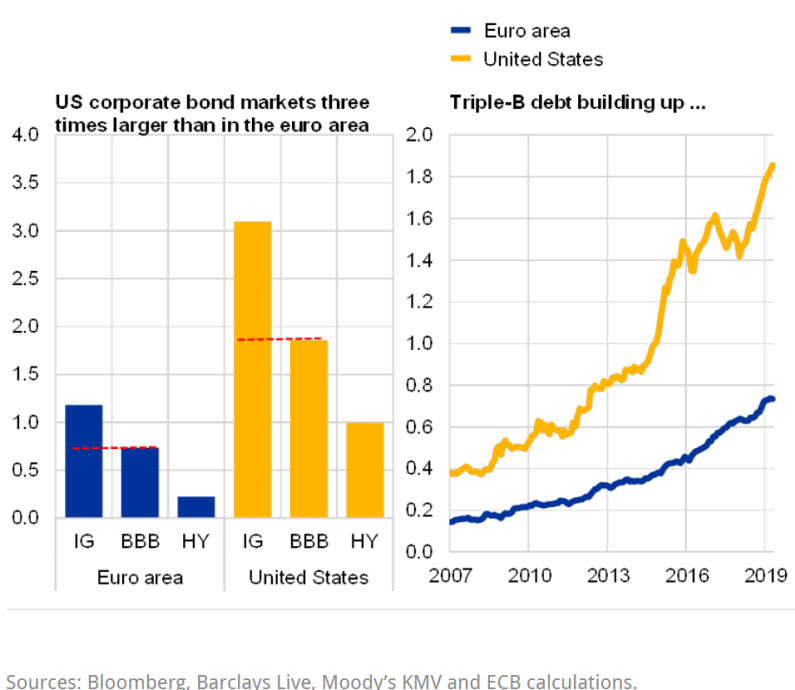Earlier this week – I went on a four-tweet rant highlighting the toxic debt vehicle known as the ‘collateralized loan obligation’ (aka CLO). . .
The CLO’s a vehicle that pools together millions-worth-of-loans that were underwritten for privately owned businesses. Which then get organized into different pools (called ‘tranches’) by maturity and risk. And then receives a credit rating.
For example, a bank will pile all the AAA-rated (high-quality) debt into one tranche. And all the BBB-rated (lower-quality) debt into another.
And as always – the higher-rated tranches are safer – but pay less interest to buyers (lower risk – lower return). And the lower-rated tranches are riskier – but pay more interest to buyers (higher risk – higher return).
Then – once these tranches are made – they’re sold off to investors.
(Basically – in summary – CLO’s are exactly like the mortgage-backed security – MBS – except with corporate debt, and not mortgages).
So – what’s the problem?
Well – as I detailed two weeks ago – there’s a massive wall of BBB-rated corporate debt (the last notch before junk status) in the U.S. that’s at risk of being downgraded if economic conditions continue declining.
But – this BBB-rated corporate debt binge is also on the rise in Europe – and has all the same risks. . .

Now – both the Federal Reserve and the European Central Bank (ECB) have recently touched on the heavily indebted corporate sector and the declining standards of loans being bundled into market securities – such as CLO’s.
To give you some context – the ECB noted a surge in euro-area funds and insurance firms that have dramatically increased their exposure to low-rated (BBB) debt.
(For perspective – by the end of 2018 – BBB-rated debt represented 40% of both insurance and pension fund holdings. And 35% for investment funds).
How did this surge in risky-debt happen?
Well – two big reasons.
First – years of zero-and-negative interest rates in the euro-zone have pushed investors in search (and need) of yield into riskier assets – like the CLO’s (with some of the riskier tranches offering 9%-plus).
And secondly – excessive demand for higher-yields (and more risk) have made it easier than ever for lower-creditworthy firms to borrow massive amounts of money. (Especially with the rise of ‘shadow banks’ – the non-regulated lenders that borrow cheap short-term debt and ‘lend long’ – pocketing the difference).
And when times are good – these indebted corporations could make their debt payments – and the CLO buyers would collect their interest.
But with the global economy slowing down (especially in the euro-zone and Germany) – these firms are at real risk of suffering declining cash flows – or worse – having their debt downgraded.
This could trigger huge losses for CLO holders (especially the big banks). And those that guarantee the corporate debt (via credit-default swaps – CDS).
(Don’t know what a CDS is? Read here for this easy explanation).
Already financial industry leaders are beginning to prepare for what happens next.
Brian Moynihan – CEO of Bank of America (NYSE:BAC) (the leader in arranging high-risk corporate loans) – said that some highly leveraged firms could face “carnage” if the economy continues slowing.
Also, PIMCO – the world’s largest bond investor – said recently that the credit market is “probably the riskiest ever”.
And things may already be reaching a ‘tipping-point’ in the European leveraged-loan market. . .
For instance – the French holding company Rallye SA (parent company of the supermarket Casino Guichard-Perrachon SA) recently saw its shares collapse when they filed for creditor protection last month because it couldn’t repay debts. (For years Rallye SA depended on the dividend from Casino to repay lenders. And it also had pledged nearly all of its Casino shares to lenders as guarantees on the loans).
I expect this type of news to continue throughout Europe as economic conditions decelerate.
So – in summary – the euro-zone (like the U.S.) faces the real risk of having hundreds-of-billions in corporate debt downgraded. And at this stage in the market-cycle – puts them in a very fragile position.
Insurance firms, pension funds, and investment companies are all large holders of these CLO’s that could quickly become worthless.
(Remember in 2008 when subprime mortgages began defaulting – and soon after investors began questioning what was actually inside the mortgage-backed securities they owned – regardless of the ratings?).
Every major market crash in recent history has been built on such ‘contraptions’ that were poorly understood and blew-up at the wrong time.
I call these weapons of mass-financial destruction (WFD).
Some examples are – mortgage-backed securities (MBS) in 2008, savings and loans (S&L’s) in 1991, portfolio-insurance in 1987, leveraged investment trusts in 1929, and holding companies in 1907. . .
So – don’t be surprised if CLO’s are what eventually cause the next market crash.
I’ll be searching for potential plays in the European debt market to bet against. Stay tuned.
